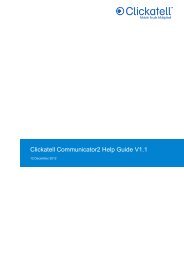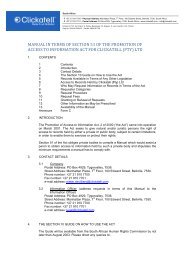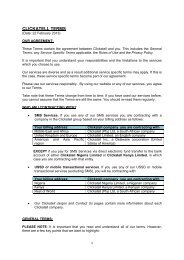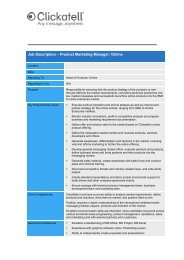SMTP API Specification - Clickatell
SMTP API Specification - Clickatell
SMTP API Specification - Clickatell
Create successful ePaper yourself
Turn your PDF publications into a flip-book with our unique Google optimized e-Paper software.
<strong>SMTP</strong> <strong>API</strong> <strong>Specification</strong> V2.4.6<br />
September 2014
<strong>SMTP</strong> <strong>API</strong> <strong>Specification</strong> V2.4.6<br />
Contents<br />
Change History .............................................................................................................................................. 3<br />
Overview ........................................................................................................................................................ 4<br />
1. Introduction .......................................................................................................................................... 4<br />
2. Getting started ..................................................................................................................................... 5<br />
3. Basic email structure ........................................................................................................................... 6<br />
3.1 Authentication ............................................................................................................................ 6<br />
3.2 Send a message ....................................................................................................................... 7<br />
3.3 Text parameter versus the data parameter ............................................................................... 8<br />
4. Message parameters ........................................................................................................................... 9<br />
4.1 Table of parameters .................................................................................................................. 9<br />
4.2 Message parameters in detail ................................................................................................. 12<br />
4.2.1 Destination address (to) .............................................................................................. 12<br />
Text .......................................................................................................................................... 12<br />
4.2.2 Source address (from)................................................................................................. 12<br />
4.2.3 Delivery acknowledgement (deliv_ack)....................................................................... 13<br />
4.2.4 Callback System (callback) ......................................................................................... 14<br />
4.2.5 Delivery time (deliv_time)............................................................................................ 16<br />
4.2.6 Concatenation (CONCAT).............................................................................................. 17<br />
4.2.7 Maximum credits (max_credits) .................................................................................. 17<br />
4.2.8 Required features (req_feat) ....................................................................................... 18<br />
4.2.9 Delivery queue ............................................................................................................ 18<br />
4.2.10 Gateway escalation (escalate) .................................................................................. 19<br />
4.2.11 Mobile originated (MO).............................................................................................. 19<br />
4.2.12 Client message ID (climsgid) .................................................................................... 20<br />
4.2.13 Unicode (unicode) ..................................................................................................... 20<br />
4.2.14 Message types (msg_type) ....................................................................................... 21<br />
4.2.15 Validity period (validity) ............................................................................................. 21<br />
4.2.16 Reply (reply) .............................................................................................................. 21<br />
4.2.17 URL encoded text (urltext) ........................................................................................ 22<br />
5. Batch messaging ............................................................................................................................... 23<br />
5.1.1 CSV line parameter (csv) ............................................................................................ 23<br />
5.1.2 CSV template parameter (csvtemplate) ...................................................................... 24<br />
6. 8-bit messaging ................................................................................................................................. 24<br />
7. Messaging examples ......................................................................................................................... 25<br />
7.1 Simple examples ..................................................................................................................... 25<br />
7.1.1 Standard email ............................................................................................................ 25<br />
7.1.2 Flash SMS with sender ID ........................................................................................... 25<br />
7.1.3 Email with HTTP delivery ack and callback request set ............................................. 25<br />
7.2 Batch messaging examples .................................................................................................... 25<br />
7.2.1 Sending the same message to multiple recipients ...................................................... 25<br />
7.2.2 Sending a personalised message to multiple recipients ............................................. 25<br />
7.2.3 Configuring individual messages in a batch ................................................................ 26<br />
7.3 8-bit SMS examples ................................................................................................................ 26<br />
7.3.1 Sending a ringtone ...................................................................................................... 26<br />
7.3.2 Sending an operator logo ............................................................................................ 26<br />
7.3.3 Removing an operator logo ......................................................................................... 26<br />
7.3.4 Sending a VCARD ....................................................................................................... 27<br />
7.3.5 Sending a VCAL .......................................................................................................... 27<br />
8. Appendix A: Error codes .................................................................................................................... 28<br />
9. Appendix B: Message Statuses ......................................................................................................... 29<br />
10. Terminology ....................................................................................................................................... 30<br />
11. Contact details ................................................................................................................................... 31<br />
www.clickatell.com<br />
2
<strong>SMTP</strong> <strong>API</strong> <strong>Specification</strong> V2.4.6<br />
Change History<br />
Approximately six (6) months of changes are reflected.<br />
Visit http://www.clickatell.com/downloads/smtp/<strong>Clickatell</strong>_<strong>SMTP</strong>.pdf to check for updates to this document.<br />
Version Date Section Changes to Documentation<br />
2.4.6 General review and document update.<br />
2.4.5 25 November 2013 4 Amended the section titled ‘validity period’<br />
www.clickatell.com<br />
3
<strong>SMTP</strong> <strong>API</strong> <strong>Specification</strong> V2.4.6<br />
Overview<br />
This technical document is intended for developers who wish to use the <strong>Clickatell</strong> <strong>SMTP</strong> <strong>API</strong> for sending<br />
messages and describes the various programming methods and commands used by developers when<br />
using this <strong>API</strong>.<br />
The <strong>SMTP</strong> <strong>API</strong> allows you to send SMS messages via email. Your application can then send SMSs by<br />
specifying your username, password and <strong>API</strong> ID in the body of the email, together with the message you<br />
want to send and the list of recipients.<br />
To use this <strong>API</strong>, you need to register at (http://www.clickatell.com/register/product=1). When you sign up<br />
for an <strong>SMTP</strong> account you will be given a username, password and api_id: keep these at hand. Once you<br />
have registered and been activated you will receive 10 free credits with which to test our service.<br />
Messages sent with these credits contain a pre-populated message. You can test the <strong>API</strong> using these<br />
credits, and purchase credits to start sending your own, customised messages<br />
It is recommended that you have an understanding of routingprofiles before reading this document.<br />
Information is available at https://www.clickatell.com/resources/product-help/developers-central/routingprofile-guide/.<br />
There are a number of different ways of gaining access to the gateway:<br />
• <strong>SMTP</strong> - enabling a server or client generated email to be delivered as an SMS.<br />
• HTTP / HTTPS - submitting either a POST or GET to the <strong>API</strong> server.<br />
• FTP – uploading a text file to our FTP Server.<br />
• XML – posting to our gateway using XML over HTTP/S.<br />
• COM Object – for Windows based development.<br />
• SOAP – submit SOAP packets over HTTP/S.<br />
• SMPP – customers requiring a high throughput binary socket connection.<br />
In order to reduce testing costs, <strong>Clickatell</strong> offers a test number range. Messages sent to any number on<br />
this prefix will only be charged 1/3 of a credit. Use the number 279991xxxxx (for South Africa) or<br />
1999xxxxxxx (for the U.S.) where “xxxxx” represents any numeric string. Message statuses will be<br />
returned.<br />
We will cover the <strong>SMTP</strong> method in this document. Additional documentation is available for the other<br />
methods.<br />
1. Introduction<br />
Quite often, the only way of getting a server to send SMS messages via <strong>Clickatell</strong>’s gateway is via a<br />
server-generated email. This <strong>API</strong> connection facilitates that operation. It supports most of the functionality<br />
of the HTTP <strong>API</strong> version 2.3.0 including 8-bit messaging and templating.<br />
The recommended batch size is 10 000 messages with a maximum of 50 000 messages per email<br />
allowed.<br />
Note: It is important that the ENTIRE document is read before contacting support.<br />
www.clickatell.com<br />
4
<strong>SMTP</strong> <strong>API</strong> <strong>Specification</strong> V2.4.6<br />
2. Getting started<br />
In order to use the <strong>Clickatell</strong> gateway you need a <strong>Clickatell</strong> account and at least one registered connection<br />
(<strong>API</strong> sub-product instance) between your application and our gateway. Each connection method is known<br />
as a sub-product (of our <strong>API</strong> product). You can follow these steps to get started:<br />
Step 1 - register for a <strong>Clickatell</strong> account<br />
If you do not already have a Developers’ Central account, you need to register for one. If you already have<br />
a <strong>Clickatell</strong> Central account, proceed to Step 2 for instructions on how to edit an <strong>API</strong> connection on your<br />
account.<br />
• Go to https://www.clickatell.com/clickatell-products/online-products/sms-gateway-developers-central/,<br />
and click on the ‘Try Developers’ Central Now’ button.<br />
• Select the Developers’ Central and the Account type you would like to use.<br />
• Enter your personal information to complete the registration form<br />
• Accept Terms & Conditions<br />
• Click the ‘Create my Account’ button - an email containing your login details will be sent to the email<br />
address you have provided.<br />
Step 2 – Login to your account<br />
When you have logged in you will be on the <strong>Clickatell</strong> Central landing page. You will receive 10 free<br />
credits which you can use to test the <strong>Clickatell</strong> Gateway. Messages sent with these credits contain a prepopulated<br />
<strong>Clickatell</strong> message.<br />
A HTTP <strong>API</strong> will be added to your account for you. This will allow you to start testing the <strong>Clickatell</strong><br />
Gateway immediately. You can purchase credits when you are ready to start sending personalised<br />
messages.<br />
Step 3 – Adding a <strong>SMTP</strong> <strong>API</strong> to your account<br />
To add a <strong>SMTP</strong> <strong>API</strong> to your account select <strong>API</strong>s from the main menu and then select Setup a new <strong>API</strong><br />
from the submenu. Click the Add FTP <strong>API</strong> button on the Setup <strong>API</strong> page that opens. You can then<br />
complete all the required details to configure your <strong>API</strong>.<br />
Note: For more information on managing your <strong>API</strong> connections within your <strong>Clickatell</strong> account see our <strong>API</strong><br />
guide at http://www.clickatell.com/help-support/developer-apis/clickatell-api/<br />
www.clickatell.com<br />
5
<strong>SMTP</strong> <strong>API</strong> <strong>Specification</strong> V2.4.6<br />
3. Basic email structure<br />
To send a message with the <strong>Clickatell</strong> <strong>SMTP</strong> <strong>API</strong>, the system interprets variables that you pass in the<br />
body of the email. Each line represents a variable in the form of:<br />
variablename:value<br />
variablename:value<br />
variablename:value<br />
We endeavour to strip any superfluous white space that may occur either side of the colon. However, to<br />
avoid any erroneous characters from creeping into the email by mail clients, we suggest that you keep to<br />
the format shown above.<br />
Note: We only accept plain-text emails. We do not process HTML-formatted emails. The “Content-<br />
Transfer-Encoding” header may only be set to 7-bit which is the default.<br />
The emails themselves should be sent to:<br />
sms@messaging.clickatell.com<br />
The subject field of the message is ignored. All the following examples are of the body only, unless<br />
otherwise indicated. Please check to determine after how many characters your email client forces wordwrapping<br />
(inserts a line-break). Make sure the length of each line is less then this value. We read a<br />
maximum of 8192 bytes from each line, so avoid having too many comma delimited destination<br />
addresses. If uncertain, please test before sending large volumes.<br />
3.1 Authentication<br />
In order to deliver a message, the system needs to authenticate the request as coming from a valid<br />
source. We use a number of parameters to achieve this:<br />
<br />
<br />
<br />
api_id: This is issued to you when you register for the <strong>API</strong> product.<br />
user: This is the username of your account.<br />
password: The current password you have set on your account.<br />
You can send multiple emails on the same <strong>API</strong> account simultaneously.<br />
Example<br />
api_id:1234<br />
user:xxxxxxxxx<br />
password:xxxxxxxxxxx<br />
Note: To receive a response from the <strong>API</strong>, use the ‘reply:your email address’ parameter, and you will<br />
receive an <strong>API</strong> response in the form of an email. See the reply parameter for more information.<br />
www.clickatell.com<br />
6
<strong>SMTP</strong> <strong>API</strong> <strong>Specification</strong> V2.4.6<br />
3.2 Send a message<br />
Once you have set up the three authentication variables listed above, there are only another two<br />
parameters that are required before you can send an SMS via <strong>SMTP</strong>.<br />
to:xxxxxxxxxxxxxxxx<br />
This parameter sets the destination address. You may send the same SMS to one or more recipients in a<br />
single email. There are two ways to achieve this, either using comma-delimited destination addresses<br />
(ensure that there are no spaces before or after the comma), for example:<br />
to:xxxxxxxxxxxxxxxx,xxxxxxxxxxxxxxxx,xxxxxxxxxxxxxxxx,xxxxxxxxxxxxxxxx<br />
or multiple lines, e.g:<br />
to:xxxxxxxxxxxxxxxx<br />
to:xxxxxxxxxxxxxxxx<br />
to:xxxxxxxxxxxxxxxx<br />
to:xxxxxxxxxxxxxxxx<br />
The last variable is the text parameter. The text parameter can run over multiple lines. This enables you to<br />
insert new lines in your SMS. It also ensures that when your mail client is line wrapping, that the text<br />
delivered to the handset is not cut at the line wrap of your email, for example:<br />
Email:<br />
Resultant SMS:<br />
text:Line 1 Line 1<br />
text:Line 2 Line 2<br />
text:Line 3 Line 3<br />
Simple Example<br />
api_id:1234<br />
user:xxxxxxxxx<br />
password:xxxxxxxxxxx<br />
to:1234567890,1234567890<br />
text:This is my first test SMS<br />
Note: It is suggested that the maximum length of each text line be less than 40 characters. However the<br />
maximum length is determined by the email client that you use. As such, this could be more or less than<br />
40 characters.<br />
www.clickatell.com<br />
7
<strong>SMTP</strong> <strong>API</strong> <strong>Specification</strong> V2.4.6<br />
3.3 Text parameter versus the data parameter<br />
An alternative to the text parameter is the data parameter.<br />
This parameter is used to avoid mal-formatting of an SMS, such as when a mail client inserts an unwanted<br />
line break in a text string, due to automatic line wrapping. If this parameter is used, any line break<br />
automatically inserted by the mail client will be removed when delivering the SMS.<br />
We will also strip out any white space before and after the message text lines, resulting in an unbroken<br />
text line in the resultant SMS. Therefore use the data parameter when sending binary or Unicode<br />
messages.<br />
Example 1<br />
Email sent<br />
api_id:1234<br />
user:xxxxxxxxx<br />
password:xxxxxxxxxxx<br />
to:1234567890,1234567890<br />
text:Test SMS with the email client inserting a line break here<br />
in this sentence<br />
text: . This is a new sentence<br />
SMS received<br />
Test SMS with the email client<br />
inserting a line break<br />
. This is a new sentence.<br />
In the above example the email client automatically inserts a line break before the word “here”. When the<br />
SMS is received, all text after this line break (for the first instance of the text parameter) is lost. A line<br />
break is then inserted at the end and the contents of the second text parameter added.<br />
Example 2<br />
Email sent<br />
api_id:1234<br />
user:xxxxxxxxx<br />
password:xxxxxxxxxxx<br />
to:1234567890,1234567890<br />
data:Test SMS with the Email client inserting a line break here<br />
data: . This is a new sentence.<br />
SMS received<br />
Test SMS with the Email client<br />
inserting a line break. This is a new<br />
sentence.<br />
In the above example the email client automatically inserts a line break before the word “here”. When the<br />
SMS, Is received all text after the line break for the first data line is lost. The second data line is then<br />
appended to the remaining portion of the first data line.<br />
Note: Another alternative to the text parameter is the urltext parameter. This allows you to use a URL<br />
encoded string which is useful when sending special characters such as “new line” or Greek text.<br />
www.clickatell.com<br />
8
<strong>SMTP</strong> <strong>API</strong> <strong>Specification</strong> V2.4.6<br />
4. Message parameters<br />
4.1 Table of parameters<br />
There are a variety of messaging and SMS features supported by the gateway, which can be activated by<br />
including a number of additional parameters. These parameters include those in the table below.<br />
Name<br />
Parameter<br />
name<br />
Short description<br />
<strong>API</strong> ID api_id The value for this mandatory<br />
parameter can be found logging in<br />
online and going to <strong>API</strong>s <br />
Manage <strong>API</strong>s<br />
Username user The username you specified.<br />
Password password Your Developers’ Central account<br />
password.<br />
Destination<br />
address<br />
to<br />
The number of the handset to<br />
which the message must be<br />
delivered. The number should be<br />
in international number format.<br />
Text text The text content of the message.<br />
Note that some characters take up<br />
two characters because of GSM<br />
encoding standards<br />
Source address from The source/sender address that<br />
the message will appear to come<br />
from also known as “Sender ID”.<br />
These must be registered within<br />
your online account and approved<br />
by us before they may be used.<br />
MO numbers rented from us do<br />
not require approval.<br />
Enable callback callback Enables you to receive message<br />
delivery statuses via an HTTP,<br />
SOAP or XML callback which is<br />
posted to a URL of yours using<br />
the GET or POST method. This is<br />
done every time a message status<br />
is updated.<br />
Delivery time deliv_time Delays delivery of SMS to mobile<br />
device in minutes relative to the<br />
time at which the SMS was<br />
received by our gateway. This<br />
should be greater than 10 minutes<br />
for best effect. Smaller time<br />
frames may be delivered too<br />
soon.<br />
Default<br />
value<br />
gateway<br />
assigned<br />
number<br />
Restricted<br />
values<br />
No ‘00’ prefix or<br />
leading “+”<br />
symbol should<br />
be used.<br />
Go to<br />
http://forums.cli<br />
ckatell.com/clic<br />
katell<br />
search for<br />
‘Why do some<br />
characters take<br />
two spaces’<br />
A valid<br />
international<br />
format number<br />
between 1 and<br />
16 characters<br />
long, or an 11<br />
character<br />
alphanumeric<br />
string.<br />
0 0,1,2,3,4,5,6,7<br />
Read detailed<br />
description of<br />
parameter.<br />
The upper limit is<br />
7 days, or 10080<br />
minutes.<br />
www.clickatell.com<br />
9
<strong>SMTP</strong> <strong>API</strong> <strong>Specification</strong> V2.4.6<br />
Name<br />
Parameter<br />
name<br />
Short description<br />
Concatenation concat Specifies the maximum number of<br />
message parts available for the<br />
message.<br />
Maximum credits max_credits Overrides the maximum charge<br />
specified online in “profiles”. It<br />
works within the bounds of the<br />
profiles. In other words a profile<br />
must exist for the maximum credit<br />
that you set.<br />
Required features req_feat Allows you to set the features which<br />
must be included when a message<br />
is sent. If the route does not<br />
support the features which you set<br />
as ‘required’ the message will fail.<br />
Default<br />
value<br />
1 1,2,3<br />
As per<br />
profiles<br />
Restricted<br />
values<br />
0.8,1,1.5,2,2.5,3<br />
Read detailed<br />
description of<br />
parameter.<br />
Note: The use of this parameter<br />
could increase the cost per<br />
message if a more expensive<br />
gateway is used.<br />
Delivery queue queue Delivers the message through one<br />
of three queues assigned to each<br />
client account. Messages in the<br />
highest priority queue will be<br />
delivered first.<br />
Gateway<br />
escalation<br />
escalate<br />
Prompts an escalation to an<br />
alternative route, if messages are<br />
queued on the least-cost route.<br />
Mobile originated mo This is only applicable to clients<br />
that have subscribed to a two-way<br />
messaging service. We route via a<br />
pre-defined carrier to enable the<br />
ability for a reply to be received<br />
back.<br />
Client message ID cliMsgId Client message ID defined by user<br />
for message tracking.<br />
Unicode message unicode Two digit language code. Convert<br />
your text to Unicode [UCS-2<br />
encoding]. See<br />
http://www.Unicode.org/.<br />
3 1, 2,3<br />
1 is highest<br />
priority.<br />
0 0 - off<br />
1 - Escalate<br />
immediately to<br />
an alternative<br />
route if<br />
messages are<br />
queued on the<br />
least-cost route.<br />
0 0 – Off. We use<br />
our normal<br />
routing rules.<br />
1 – Enable<br />
Reply.<br />
Up to 32<br />
alphanumeric<br />
characters. No<br />
spaces.<br />
0 0 – No Unicode<br />
1 – Send as<br />
Unicode.<br />
Message type msg_type Message types are associated<br />
with a structure that defines the<br />
fields of the message; e.g. logos<br />
and ringtones. See Message<br />
Types for more information.<br />
SMS_TE<br />
XT<br />
www.clickatell.com<br />
10
<strong>SMTP</strong> <strong>API</strong> <strong>Specification</strong> V2.4.6<br />
Name<br />
Parameter<br />
name<br />
Short description<br />
User data header udh Informs the mobile handset of the<br />
type of data and data length of the<br />
user data part of an SMS<br />
message. The UDH header is<br />
used in conjunction with Binary<br />
content to define message types.<br />
See 8 bit messaging for more<br />
information.<br />
Data data The data content of a message, if<br />
the UDH component is set<br />
manually.<br />
Validity period validity The validity period in minutes<br />
relative to the time at which the<br />
SMS was received by our<br />
gateway. The message will not be<br />
delivered if it is still queued on our<br />
gateway after this time period.<br />
Default<br />
value<br />
1440<br />
minutes<br />
(24<br />
hours)<br />
Restricted<br />
values<br />
Set UDH data<br />
manually.<br />
Set value in X<br />
minutes from 1 –<br />
1440 minutes.<br />
www.clickatell.com<br />
11
<strong>SMTP</strong> <strong>API</strong> <strong>Specification</strong> V2.4.6<br />
The following additional parameters are also available to the <strong>SMTP</strong> <strong>API</strong><br />
Name<br />
Parameter<br />
Name<br />
Short Description<br />
Reply reply One or more email addresses<br />
which will be sent either a unique<br />
identifier for each message or an<br />
error code<br />
CSV Line csv Used in conjunction with text<br />
parameter to handle personalised<br />
batch messaging.<br />
Delimiter delimiter Specify a specific character to be<br />
used to delimit values in the CSV<br />
field. Useful if certain values<br />
contain a comma. If not set,<br />
defaults to a comma.<br />
CSV Template csvtemplate Used in conjunction with text<br />
parameter to handle personalised<br />
batch messaging where additional<br />
message parameters need to be<br />
set on a message by message<br />
basis<br />
URL encoded text urltext Useful for special Greek<br />
characters, etc.<br />
Default<br />
Value<br />
,<br />
Restricted<br />
Values<br />
The mobile<br />
number must be<br />
the first value in<br />
the CSV field.<br />
4.2 Message parameters in detail<br />
4.2.1 Destination address (to)<br />
SMS messages need to be sent in the standard international format, with country code followed by<br />
number. No leading zero to the number and no special characters such as "+" or spaces must be used.<br />
For example, a number in the UK being 07901231234 should be changed to 447901231234.<br />
If the optional <strong>API</strong> setting titled ‘Replace the leading zero with correct country code’ is enabled for the <strong>API</strong><br />
in your Developers’ Central account, any mobile numbers starting with zero will have the zero stripped and<br />
replaced with the international dialling code.<br />
Parameter:<br />
to:xxxxxxxxxxx<br />
Text<br />
This is the default parameter that is used to add message content. A single text message can contain up<br />
to 160 characters or 140 bytes.<br />
4.2.2 Source address (from)<br />
The source address (from), also known as the sender ID, can be either a valid international format<br />
number between 1 and 16 characters long, or an 11 character alphanumeric string. These must be<br />
registered within your online account and approved by us before they may be used. MO numbers rented<br />
from us do not require approval<br />
Note that characters such as spaces, punctuation, Unicode and other special characters may not always<br />
be supported to all destinations and could interfere with your delivery. We suggest that you refrain from<br />
www.clickatell.com<br />
12
<strong>SMTP</strong> <strong>API</strong> <strong>Specification</strong> V2.4.6<br />
using such characters on the source address. The use of an alphanumeric source address with 8-bit<br />
messaging may cause message failure. This service is not guaranteed across all mobile networks and<br />
may interfere with delivery to certain handsets.<br />
Note: To ensure that this feature is supported when delivering your message, the required features<br />
(req_feat) parameter for this feature must be set.<br />
Parameter:<br />
from:xxxxxxxxxxx<br />
Note: To ensure that this feature is supported when delivering your message, the required features<br />
(req_feat) parameter for this feature must be set.<br />
4.2.3 Delivery acknowledgement (deliv_ack)<br />
In order to determine whether an SMS has been received by a handset or not, we request delivery<br />
acknowledgement for every message we send. The ability to receive reliable delivery acknowledgements<br />
varies between mobile networks. Please test to a specific mobile network first, before assuming that you<br />
will receive handset acknowledgments for messages that are delivered.<br />
If a GSM handset is ‘absent’, e.g. switched off or out of coverage, the SMS will be delivered according to a<br />
retry cycle once the handset is back in coverage. A delivery receipt will only be returned if and when the<br />
retry is delivered. If the validity period or retry cycle (typically 24 hours) is exceeded, the SMS will fail and<br />
show ‘Error Delivering Message’ or status 8.<br />
Delivery acknowledgements can be monitored via the callback system or online reports.<br />
www.clickatell.com<br />
13
<strong>SMTP</strong> <strong>API</strong> <strong>Specification</strong> V2.4.6<br />
.<br />
4.2.4 Callback System (callback)<br />
Final or intermediary statuses are passed back by the <strong>API</strong> depending on the callback value set in the<br />
original post. This is done by means of:<br />
<br />
<br />
<br />
<br />
<br />
<br />
<br />
HTTP GET<br />
HTTP POST<br />
JSON POST<br />
XML GET<br />
XML POST<br />
SOAP GET<br />
SOAP POST<br />
The variables returned are apiMsgId, cliMsgId, to, timestamp, from, status and charge.<br />
Validation of Callback URL<br />
The URL entered in your <strong>Clickatell</strong> central account to receive 'SMS Status notifications' is validated to<br />
check if a callback can be completed. The URL must begin with either http:// (non-encrypted) or https://<br />
(encrypted). If the callback URL is invalid, a message is displayed indicating an Invalid URL.<br />
Callback retry interval<br />
The MT callback system will make 8 attempts to deliver a callback to your specified callback URL.<br />
For Example:<br />
1. 2 minutes after the original attempt<br />
2. 4 minutes after last retry<br />
3. 8 minutes after last retry<br />
4. 16 minutes after last retry<br />
5. 32 minutes after last retry<br />
6. 64 minutes after last retry<br />
7. 128 minutes after last retry<br />
8. 3 days after last retry (max retries reached)<br />
Optional Callback username and password<br />
An optional “username” and “password” can be set in the preferences section of your <strong>API</strong> product. This<br />
username and passwords is not the same as your <strong>Clickatell</strong> username and password but is a setting of<br />
your choice to add additional security.<br />
Callback<br />
value<br />
Message status types returned<br />
Message status code returned<br />
0 No message status returned.<br />
1 Returns only intermediate statuses. 002, 003, 011<br />
2 Returns only final statuses of a message. 004, 005, 006, 007, 008, 010, 012<br />
3 Returns both intermediate and final statuses of a<br />
message.<br />
All except 001<br />
www.clickatell.com<br />
14
<strong>SMTP</strong> <strong>API</strong> <strong>Specification</strong> V2.4.6<br />
4 Returns only error statuses of a message. 005, 007, 009, 010, and 012<br />
5 Returns both intermediate and error statuses of a<br />
message.<br />
6 Returns both final and error statuses of a<br />
message.<br />
7 Returns both intermediate, final and error<br />
statuses of a message.<br />
003, 005, 007, 009, 010, 012<br />
004, 005, 007, 009, 010, 012<br />
003, 004, 005, 007, 009, 010, 012<br />
Examples<br />
- HTTP<br />
Sample callback to your callback URL using an HTTP get:<br />
https://www.yoururl.com/script.aspapi_id=12345&apiMsgId=996f364775e24b8432f45d77da8eca47&cliM<br />
sgId=abc123×tamp=1218007814&to=279995631564&from=27833001171&status=003&charge=0.3<br />
00000<br />
- JSON<br />
Sample callback to your callback URL using an HTTP get:<br />
{<br />
}<br />
"data":{<br />
"apiId" : 123456,<br />
"apiMessageId" : "abcdef1234567890abcdef1234567890",<br />
"clientMessageId" : "MyMessageId",<br />
"timestamp" : 2147483647,<br />
"to" : "27821234567",<br />
"from" : "SenderId",<br />
"charge" : 1.0,<br />
"messageStatus" : "003"<br />
}<br />
- XML<br />
The following data is sent in XML MT callbacks in a parameter called ‘data’:<br />
<br />
<br />
996411ad91fa211e7d17bc873aa4a41d<br />
<br />
1218008129<br />
279995631564<br />
27833001171<br />
0.300000<br />
004<br />
<br />
www.clickatell.com<br />
15
<strong>SMTP</strong> <strong>API</strong> <strong>Specification</strong> V2.4.6<br />
Sample callback to your callback URL using an XML GET:<br />
https://www.yoururl.com/script.phpdata=996411ad91fa211e7d17bc873aa4a41d1218008129279995631564278330011710.300000004<br />
- SOAP<br />
With the SOAP callback method, a SOAP packet will be sent with a parameter called ‘data’. Below is an<br />
example packet that will be sent to you via GET or POST.<br />
Example of a SOAP packet that will be sent to you via GET or POST:<br />
<br />
<br />
<br />
<br />
1234<br />
2e838df2ee3ea418272ae05aaf84ce5d<br />
abc123<br />
27999123456<br />
27999000224<br />
1213690834<br />
003<br />
0.300000<br />
<br />
<br />
<br />
This is an example callback URL that will be sent to your application:<br />
http://www.yoursite.com/your_url.phpdata=”<br />
1234<br />
2e838df2ee3ea418272ae05aaf84ce5dabc12327999123456<br />
279990002241213690834003<br />
0.300000”<br />
4.2.5 Delivery time (deliv_time)<br />
The delivery of an SMS message may be delayed by setting an amount of time in minutes relative to the<br />
time at which it was received by our gateway. We will store the message until the required time frame has<br />
elapsed. The maximum delay time is 10080 minutes or 7 days.<br />
Parameter:<br />
deliv_time:120<br />
www.clickatell.com<br />
16
<strong>SMTP</strong> <strong>API</strong> <strong>Specification</strong> V2.4.6<br />
4.2.6 Concatenation (CONCAT)<br />
If this value is set to 1, 2 or 3 the message will span across 1, 2 or 3 SMS messages where applicable.<br />
One text SMS will be sent for every 160 characters or 140 bytes. If a message is concatenated, it reduces<br />
the number of characters contained in each message by 7. With 8-bit concatenated messages, each SMS<br />
can support up to 140 bytes including the UDH headers.<br />
Please also see http://support.clickatell.com/faq.phpmode=view_entry&kbid=121&kbcat=26 for<br />
information on characters that require two character places.<br />
Please be aware that a single Unicode SMS can only contain a maximum of 70 characters. If a Unicode<br />
message is concatenated, it reduces the number of characters contained in each message part by 7.<br />
Values set are:<br />
Value<br />
Status<br />
1 Default - No concatenation: only 1 message.<br />
2 Concatenate a maximum of 2 messages.<br />
3 Concatenate a maximum of 3 messages.<br />
N<br />
Parameter:<br />
concat:x<br />
Concatenate a maximum of N messages.<br />
(Delivery is dependent on mobile and gateway. A maximum of 3 is<br />
recommended. The maximum amount of messages that can be<br />
concatenated is 35).<br />
4.2.7 Maximum credits (max_credits)<br />
This parameter overrides the maximum charge associated with message delivery, as set by the profiles<br />
selected within your client account after logging in online. This parameter can be used to limit the cost of a<br />
message to a particular value and is bound by the maximum credit value specified in your profiles.<br />
A valid <strong>API</strong> message ID can still be returned for messages that are not delivered as a result of the<br />
maximum credits value set. These messages will have a status of routing error (009).<br />
The credit value in this parameter can be set to any amount of credits. To set your delivery profile, go to<br />
Manage account Account overview and click the link Control the routing of messages located in<br />
the section titled Account Type.<br />
www.clickatell.com<br />
17
<strong>SMTP</strong> <strong>API</strong> <strong>Specification</strong> V2.4.6<br />
Parameter:<br />
max_credits:3<br />
4.2.8 Required features (req_feat)<br />
This parameter specifies the features that must be present in order for message delivery to occur. If all<br />
features are not present, the message will not be delivered. This prevents SMS messages arriving at a<br />
destination via the least-cost gateway, without certain features. This would, for instance, prevent the<br />
dropping of a sender ID.<br />
This means that we will not route messages through a gateway that cannot support the required features<br />
you have set. For certain message types, we always set the required feature bitmask where relevant.<br />
These are FEAT_8BIT, FEAT_UDH, FEAT_UCS2 and FEAT_CONCAT.<br />
This parameter is set using a combined decimal number to refer to the additional required features.<br />
E.g.: 32 + 512 = 544 – Numeric sender ID and Flash SMS both required.<br />
The value you would set to ensure that Flash and numeric sender ID are both supported, would therefore<br />
be 544.<br />
To ensure that delivery acknowledgment and alphanumeric IDs are supported you would use the value<br />
8240 (16 + 32 + 8192).<br />
Hex value Decimal Feature Description<br />
0x0001 1 FEAT_TEXT Text – set by default.<br />
0x0002 2 FEAT_8BIT 8-bit messaging – set by default.<br />
0x0004 4 FEAT_UDH UDH (Binary) - set by default.<br />
0x0008 8 FEAT_UCS2 UCS2 / Unicode – set by default.<br />
0x0010 16 FEAT_ALPHA Alpha source address (from parameter).<br />
0x0020 32 FEAT_NUMER Numeric source address (from parameter).<br />
0x0200 512 FEAT_FLASH Flash messaging.<br />
0x2000 8192 FEAT_DELIVACK Delivery acknowledgments.<br />
0x4000 16384 FEAT_CONCAT Concatenation – set by default.<br />
Parameter:<br />
req_feat:####<br />
4.2.9 Delivery queue<br />
Setting this parameter will assign the message to one of three queues assigned to each user account.<br />
This sets the priority of a message sent to us, relative to other messages sent from the same user<br />
account. Messages in queue number 1, will always be delivered before messages in queue number 2 and<br />
3, while messages in the 3rd queue, will have the lowest priority (relative to queues 1 and 2).<br />
This is useful when delivering, for example, a single high priority message while you have a large batch<br />
going through that same account. The large batch will be queued through queue number 3 (default), and<br />
urgent alerts (sent through queue 1), will be delivered ahead of those messages in the batch (queue 3),<br />
regardless of when they are actually sent to us.<br />
www.clickatell.com<br />
18
<strong>SMTP</strong> <strong>API</strong> <strong>Specification</strong> V2.4.6<br />
Values set are:<br />
Value<br />
Status<br />
1 Use first / primary user queue (highest priority).<br />
2 Use second user queue.<br />
3 Use third user queue (lowest priority) - Default status.<br />
Parameter:<br />
queue:2<br />
4.2.10 Gateway escalation (escalate)<br />
By default, the message router will select the lowest cost route (matching features and reliability) that is<br />
available for a given destination.<br />
This parameter ensures that, should a message be delayed due to gateway congestion or some other<br />
reason on the initial gateway selected by our router, then alternative routes that match the required<br />
features will be sought. This is done by moving through the available gateways in order of increasing cost,<br />
up to the maximum charge set by the user either using the parameter that defines the maximum credits or<br />
based on the profiles selected.<br />
When urgent and high priority messages are sent, they should be posted with escalate set to 1 (on),<br />
combined with a high maximum credit value to ensure that the greatest number of gateways are<br />
available.<br />
Values set are:<br />
Value<br />
Status<br />
0 Off – Default value.<br />
1 On - Escalate immediately to an alternative route if the messages<br />
are queued on the least-cost route.<br />
Parameter:<br />
escalate:1<br />
4.2.11 Mobile originated (MO)<br />
This parameter is only used when a message is sent to a handset and a reply is expected.<br />
PLEASE NOTE: This parameter is only valid for clients that have signed up and paid for our twoway<br />
messaging service. An alternative to our least-cost gateway may be used, which could result<br />
in a higher cost per message. Please email <strong>Clickatell</strong> support for pricing or view online.<br />
When sending a normal MT message to a handset and you expect a reply to your registered MO number,<br />
please set the mo parameter to “1”.<br />
Values to set are:<br />
Value<br />
Status<br />
0 Off - Default status. We use the normal routing feature.<br />
1 Enables reply ability. We route via a pre-defined carrier to enable the ability to<br />
reply.<br />
www.clickatell.com<br />
19
<strong>SMTP</strong> <strong>API</strong> <strong>Specification</strong> V2.4.6<br />
It is important that the user specifies the correct from parameter together with this parameter. If no from<br />
parameter is specified, we will use a default originator number as set by <strong>Clickatell</strong>. You will NOT receive<br />
these replies.<br />
If you specify the originator (the purchased mo number), then we will route the message such that it can<br />
be replied to by the recipient. This reply will be sent to you.<br />
Parameter:<br />
mo:1<br />
4.2.12 Client message ID (climsgid)<br />
This parameter is set by the user to enable internal message tracking. It allows the user to set their own<br />
tracking ID for each message. Once set for a given message, this may be used in place of the <strong>Clickatell</strong><br />
issued <strong>API</strong> message ID (apimsgid) for querying message.<br />
A client message ID (climsgid) may be any combination of alphanumeric characters excluding spaces. A<br />
maximum of 32 characters may be used.<br />
Parameter:<br />
climsgid:xxxx<br />
4.2.13 Unicode (unicode)<br />
If this value is set to 1, the text field must contain two-byte Unicode. Each SMS can handle a maximum of<br />
70 characters. Each Unicode character must be hex-encoded. More information is available at<br />
http://www.Unicode.org/.<br />
Note: When using the batch send facility for delivering Unicode messages, it is not possible to substitute<br />
variables into the message content. This is only possible with Germanic characters.<br />
Values set are:<br />
Value<br />
Status<br />
0 Off - default status.<br />
1 On - delivers the text as two-byte Unicode.<br />
We provide a converter to convert text to Unicode within your client account online. Go to “Converters”<br />
from within your account online.<br />
Parameter:<br />
unicode:1<br />
E.g. “ΩΨΘ” becomes<br />
data:03A903A80398<br />
unicode:1<br />
www.clickatell.com<br />
20
<strong>SMTP</strong> <strong>API</strong> <strong>Specification</strong> V2.4.6<br />
4.2.14 Message types (msg_type)<br />
A wide variety of messages can be sent through our gateway. We have pre-defined a number of SMS<br />
message-types in the <strong>API</strong>, so that you do not have to set the UDH (user data header) manually. You may<br />
optionally set the UDH rather than using one of the message types set below.<br />
For non-Nokia message types (EMS, etc.), please generate your own UDH and data according to the<br />
manufacturers specifications of the message type you wish to send.<br />
This parameter need not be included if the SMS is a standard text message.<br />
Values set are:<br />
Value<br />
SMS_TEXT<br />
SMS_FLASH<br />
SMS_NOKIA_OLOGO<br />
SMS_NOKIA_GLOGO<br />
SMS_NOKIA_PICTURE<br />
SMS_NOKIA_RINGTONE<br />
SMS_NOKIA_RTTL<br />
SMS_NOKIA_CLEAN<br />
SMS_NOKIA_VCARD<br />
SMS_NOKIA_VCAL<br />
Description<br />
This is the default message type. It is optional to specify this<br />
parameter.<br />
To send an SMS that displays immediately upon arrival at the<br />
phone.<br />
Send an operator logo to a Nokia handset.<br />
Send a group logo to a Nokia handset.<br />
Send a picture message to certain Nokia handsets.<br />
Send a ringtone to a Nokia handset.<br />
Send an RTTTL format ringtone to Nokia handsets.<br />
Remove operator logo from a Nokia handset.<br />
Send a business card to a Nokia handset.<br />
Send an event calendar to a Nokia handset.<br />
Parameter:<br />
Please see the messaging examples at the end of this document.<br />
4.2.15 Validity period (validity)<br />
A message may be given a time frame for which it is valid. After this period the message will expire. This<br />
parameter takes an amount of time in minutes relative to the time at which the message was received by<br />
our gateway. If the message is queued on our gateway for a period exceeding the validity period set then<br />
a routing error of 115 will be returned. The default validity period is 1440 minutes (24 hours).<br />
Note: The validity period is not passed on to the upstream gateway.<br />
Parameter:<br />
validity:120<br />
4.2.16 Reply (reply)<br />
Unique message identifiers (<strong>API</strong> message IDs) are issued for each message submitted to <strong>Clickatell</strong>. In<br />
order to have <strong>API</strong> message IDs for each message returned to an email address, set this email address<br />
using the reply parameter. Multiple addresses may be comma delimited.<br />
Each message returns a unique identifier in the form of an <strong>API</strong> Message ID. This can be used to track and<br />
monitor any given message. The apimsgid is returned after each post. Alternatively an error code will be<br />
returned if the message is not accepted for delivery.<br />
www.clickatell.com<br />
21
<strong>SMTP</strong> <strong>API</strong> <strong>Specification</strong> V2.4.6<br />
Note: A message status is not returned but may viewed using the online reports or via the HTTP callback.<br />
Parameter:<br />
reply:email@yourdomain.com<br />
Response:<br />
ID: xxxx To: xxxx<br />
or<br />
ERR: Error number<br />
4.2.17 URL encoded text (urltext)<br />
Used instead of the data or text parameter, the urltext parameter can be used to send URL encoded text,<br />
which will be decoded back to normal text before the message is delivered to the phone.<br />
It is possible that text could consist of characters that will confuse email-clients. To prevent possible<br />
errors, the URL encoding scheme translates all "special" characters to their corresponding hexadecimal<br />
codes. These special characters include control characters (carriage returns, line feeds, etc.), certain<br />
alphanumeric symbols (%, ', ", #, &, , =, /, :), and other characters (Greek Bulgarian and Cyrilic<br />
characters, etc).<br />
For example, the string "Your URL encoded text!” could be sent as below.<br />
Parameter:<br />
urltext:Your%20URL%20encoded%20text%21<br />
www.clickatell.com<br />
22
<strong>SMTP</strong> <strong>API</strong> <strong>Specification</strong> V2.4.6<br />
5. Batch messaging<br />
This facility enables one to do high volume delivery and server-side message merging. It offers the enduser<br />
the ability to define all elements common to a batch, and then send only the parameters that change<br />
on a message by message basis. The following parameters are used for batch messaging.<br />
Name<br />
Parameter<br />
name<br />
Short description<br />
CSV Line csv Each csv line has a mobile<br />
number followed by a list of<br />
field values that are used to<br />
customise a text message.<br />
The text parameter value<br />
acts as a template with<br />
placeholders inserted into the<br />
text which are replaced by<br />
these field values when the<br />
message is sent.<br />
CSV<br />
template<br />
csvtemplate<br />
Used in conjunction with the<br />
text and csv parameters to<br />
handle personalised batch<br />
messaging where additional<br />
message parameters (such<br />
as delivery time) need to be<br />
set on a message by<br />
message basis. These<br />
parameter values are added<br />
after the mobile number in<br />
the CSV Line.<br />
Delimiter delimiter Specifies a specific character<br />
to be used to delimit values<br />
in the CSV parameter field<br />
values. Useful if certain<br />
values contain a comma.<br />
Default<br />
value<br />
,<br />
(comma)<br />
Restricted values<br />
The mobile number must<br />
be the first value in the<br />
CSV field.<br />
If you use the default<br />
delimiter you will not be<br />
able to use a comma in<br />
your field values.<br />
If you are using a TAB<br />
character, there must be<br />
no white space either<br />
before or after the TAB.<br />
5.1.1 CSV line parameter (csv)<br />
csv:mobile_number[delimiter]field-value[delimiter]field-value[delimiter]field-value etc.<br />
Where field-value is the data to be inserted into the template, and [delimiter] is the value as determined by<br />
the delimiter parameter.<br />
Placeholders may be inserted within the message body itself. These will take the form of #field1# through<br />
to #fieldn#. See example below. If you wish to customise the whole message on each csv line, you would<br />
then use:<br />
text:#field1#<br />
Example:<br />
api_id:1234<br />
user:xxxxxxxxx<br />
password:xxxxxxxxxxx<br />
www.clickatell.com<br />
23
<strong>SMTP</strong> <strong>API</strong> <strong>Specification</strong> V2.4.6<br />
text:Hi #field1#, your balance is #field2#, please come to the office on #field3#<br />
delimiter:|<br />
csv:1234567890|Fred|€15.50|Mondays,Wednesdays,Fridays<br />
csv:1234567890|Jane|€299.45|Tuesdays,Thursdays,Saturdays<br />
Note: If a ‘,’ (comma) was used as the default delimiter, then it would only have passed through ‘Mondays’<br />
as the value of field3 for Fred and ‘Tuesdays’ for Jane.<br />
5.1.2 CSV template parameter (csvtemplate)<br />
csvtemplate:[parameter-1],[ parameter-2],[parameter-n]<br />
Example:<br />
csvtemplate:deliv_time,cliMsgId,validity etc.<br />
These values would then appear on the csv line immediately after the mobile number. The field-values for<br />
each of the placeholders that you have inserted in your text (text parameter) are then appended to the csv<br />
line.<br />
Format: csv:mobile_number [optional csvtemplate parameters] template_placeholder_parameters<br />
Example:<br />
api_id:1234<br />
user:xxxxxxxxx<br />
password:xxxxxxxxxxx<br />
text:Hi #field1#, your balance is #field2#, please come to the office on #field3#<br />
delimiter:|<br />
csvtemplate:deliv_time|cliMsgId|validity<br />
csv:1234567890|10|id_1|60|Fred|€15.50|Mondays,Wednesdays,Fridays<br />
csv:1234567890|40|id_2|60|Jane|€299.45|Tuesdays,Thursdays,Saturdays<br />
6. 8-bit messaging<br />
Through the <strong>SMTP</strong> interface, one is also able to send 8-bit messages. These are most often used for<br />
ringtones and logos, but one can also send vCards, vCalendar appointments and EMS messages. When<br />
sending 8-bit messages, you need to set the user data header (UDH) of the SMS as well as sending the<br />
data. If you are comfortable with the creation of your own UDH, we also enable you to set it directly using<br />
the udh parameter. To simplify the process, we have provided a number of pre-defined message types<br />
(see the msg_type parameter).<br />
With the standard text parameter, line breaks are automatically inserted. The parameter data, is thus<br />
used for 8-bit messaging.<br />
Example<br />
api_id:1234<br />
user:xxxxxxxxx<br />
password:xxxxxxxxxxx<br />
to:xxxxxxxxxxxxxxxx<br />
msg_type:SMS_NOKIA_RINGTONE<br />
data:024A3A5585E195B198040042D9049741A69761781B6176156174288<br />
data:B525D85E0A26C24C49A617628930BB125E055856049865885D200<br />
www.clickatell.com<br />
24
<strong>SMTP</strong> <strong>API</strong> <strong>Specification</strong> V2.4.6<br />
7. Messaging examples<br />
7.1 Simple examples<br />
7.1.1 Standard email<br />
api_id:xxxxx<br />
user:xxxxx<br />
password:xxxxx<br />
to:1234567890<br />
text:This is my first email to SMS message<br />
7.1.2 Flash SMS with sender ID<br />
api_id:xxxxx<br />
user:xxxxx<br />
password:xxxxx<br />
to:1234567890<br />
text:Sending a flash message with sender id.<br />
msg_type:SMS_FLASH<br />
from:ME<br />
7.1.3 Email with HTTP delivery ack and callback request set<br />
api_id:xxxxx<br />
user:xxxxx<br />
password:xxxxx<br />
to: 1234567890<br />
text:Sending a message with delivery acknowledgment.<br />
deliv_ack:1<br />
callback:3<br />
7.2 Batch messaging examples<br />
7.2.1 Sending the same message to multiple recipients<br />
api_id:xxxxx<br />
user:xxxxx<br />
password:xxxxx<br />
to:1234567890,9397433991,4387347839<br />
text:This is my first email to SMS message<br />
7.2.2 Sending a personalised message to multiple recipients<br />
api_id:xxxxx<br />
user:xxxxx<br />
password:xxxxx<br />
text:Hi #field1#, your voucher number is #field2#.<br />
Delimiter:|<br />
csv:447901234567|John|agh1234te<br />
csv:447902345678|John|hfe8423ss<br />
csv:447904567890|John|njg6983ju<br />
csv:447903456789|John|cds2267wq<br />
www.clickatell.com<br />
25
<strong>SMTP</strong> <strong>API</strong> <strong>Specification</strong> V2.4.6<br />
or<br />
text:#field1#<br />
Delimiter:,<br />
csv:447901234567,Mary - your appointment is at 9:15 on Saturday 14th May<br />
csv:447902345678,Craig - your appointment is at 14:30 on Wednesday 18th May<br />
7.2.3 Configuring individual messages in a batch<br />
api_id:1234<br />
user:xxxxxxxxx<br />
password:xxxxxxxxxxx<br />
text:Hi #field1#, your balance is #field2#, please come to the office on #field3#<br />
delimiter:|<br />
csvtemplate:deliv_time|cliMsgId|validity<br />
csv:1234567890|10|id_1|60|Fred|€15.50|Mondays,Wednesdays,Fridays<br />
csv:1234567890|40|id_2|60|Jane|€299.45|Tuesdays,Thursdays,Saturdays<br />
7.3 8-bit SMS examples<br />
Note: You cannot set an alphanumeric Sender ID (from parameter) when sending 8-bit messages.<br />
7.3.1 Sending a ringtone<br />
api_id:xxxxx<br />
user:xxxxx<br />
password:xxxxx<br />
to:1234567890<br />
msg_type:SMS_NOKIA_RINGTONE<br />
data:024A3A5585E195B198040042D9049741A69761781B61761561728<br />
data:8B525D85E0A26C24C49A617628930BB125E055856049865885D200<br />
7.3.2 Sending an operator logo<br />
api_id:xxxxx<br />
user:xxxxx<br />
password:xxxxx<br />
to:1234567890<br />
msg_type:SMS_NOKIA_OLOGO<br />
data:00480e01ffffffffffffffffff800000000000000001800000<br />
data:0000000000018f1b30f1b30f1b30f9f9ff9f9ff9f9ff9f9981999<br />
data:8199981999819f1999f1999f1999f18f9998f9998f9998f9819<br />
data:9981999819998199f9999f9999f9999f98f1998f1998f1998f18<br />
data:00000000000000001800000000000000001ffffffffffffffffff<br />
7.3.3 Removing an operator logo<br />
api_id:xxxxx<br />
user:xxxxx<br />
password:xxxxx<br />
to:1234567890<br />
msg_type:SMS_NOKIA_CLEAN<br />
data:00<br />
www.clickatell.com<br />
26
<strong>SMTP</strong> <strong>API</strong> <strong>Specification</strong> V2.4.6<br />
7.3.4 Sending a VCARD<br />
api_id:xxxxx<br />
user:xxxxx<br />
password:xxxxx<br />
to:1234567890<br />
msg_type:SMS_NOKIA_VCARD<br />
urltext:BEGIN%3AVCARD%0D%0AVERSION%3A2.1%0D%0AN%3ABloggs%3BJoe<br />
urltext:%0D%0ATEL%3BPREF%3A%2B1234567890%0D%0AEND%3AVCARD%0D%0A<br />
7.3.5 Sending a VCAL<br />
api_id:xxxxx<br />
user:xxxxx<br />
password:xxxxx<br />
to:1234567890<br />
msg_type:SMS_NOKIA_VCAL<br />
urltext:BEGIN%3AVCALENDAR%0D%0AVERSION%3A1.0%0D%0ABEGIN<br />
urltext:%3AVTODO%0D%0ACATEGORIES%3AMISCELLANEOUS%0D%0A<br />
urltext:SUMMARY%3AMeet+buyers+at+Mario’s%0D%0ADTSTART<br />
urltext:%3A20030301T133000%0D%0AEND%3AVTODO%0D%0AEND%3A<br />
urltext :VCALENDAR%0D%0A<br />
www.clickatell.com<br />
27
<strong>SMTP</strong> <strong>API</strong> <strong>Specification</strong> V2.4.6<br />
8. Appendix A: Error codes<br />
The following list of error messages are generated by the <strong>Clickatell</strong> gateway during a validation phase<br />
before we accept the message. These error messages are sent back to your application. There will be no<br />
message charge if these errors are generated when sending a message. Data regarding messages that<br />
do not pass initial validation will not be included in your <strong>Clickatell</strong> Central reports.<br />
Number Description Detail<br />
001 Authentication failed Authentication details are incorrect.<br />
002 Unknown username or<br />
password<br />
Authorization error, unknown user name or incorrect password.<br />
003 Session ID expired The session ID has expired after a pre-set time of inactivity.<br />
004 Account frozen<br />
005 Missing session ID Missing session ID attribute in request.<br />
007 IP Lockdown violation You have locked down the <strong>API</strong> instance to a specific IP<br />
address and then sent from an IP address different to the one<br />
you set.<br />
101 Invalid or missing parameters One or more required parameters are missing or invalid<br />
102 Invalid user data header The format of the user data header is incorrect.<br />
103 Unknown <strong>API</strong> message ID The <strong>API</strong> message ID is unknown. Log in to your <strong>API</strong> account to<br />
check the ID or create a new one.<br />
104 Unknown client message ID The client ID message that you are querying does not exist.<br />
105 Invalid destination address The destination address you are attempting to send to is<br />
invalid.<br />
106 Invalid source address The sender address that is specified is incorrect.<br />
107 Empty message The message has no content<br />
108 Invalid or missing <strong>API</strong> ID The <strong>API</strong> message ID is either incorrect or has not been<br />
included in the <strong>API</strong> call.<br />
109 Missing message ID This can be either a client message ID or <strong>API</strong> message ID. For<br />
example when using the stop message command.<br />
110 Error with email message<br />
111 Invalid protocol<br />
112 Invalid message type<br />
113 Maximum message parts<br />
exceeded<br />
The text message component of the message is greater than<br />
the permitted 160 characters (70 Unicode characters). Select<br />
concat equal to 1,2,3-N (maximum 35) to overcome this by<br />
splitting the message across multiple messages.<br />
114 Cannot route message This implies that the gateway is not currently routing messages<br />
to this network prefix. Please email support@clickatell.com with<br />
the mobile number in question.<br />
www.clickatell.com<br />
28
<strong>SMTP</strong> <strong>API</strong> <strong>Specification</strong> V2.4.6<br />
115 Message expired Message has expired before we were able to deliver it to the<br />
upstream gateway. No charge applies.<br />
116 Invalid Unicode data The format of the unicode data entered is incorrect.<br />
120 Invalid delivery time The format of the delivery time entered is incorrect.<br />
121 Destination mobile number<br />
blocked<br />
This number is not allowed to receive messages from us and<br />
has been put on our block list.<br />
128 Number delisted This error may be returned when a number has been delisted.<br />
201 Invalid batch ID The batch ID which you have entered for batch messaging is<br />
not valid.<br />
202 No batch template The batch template has not been defined for the batch<br />
command.<br />
301 No credit left Insufficient credits<br />
302 Max allowed credit<br />
901 Internal error please retry<br />
9. Appendix B: Message Statuses<br />
These are message statuses that are generated after the <strong>Clickatell</strong> gateway has accepted the message<br />
for delivery. Data regarding messages passing initial validation and accepted for delivery will be included<br />
in your <strong>Clickatell</strong> Central reports.<br />
Number Hex Description Detail<br />
001 0x001 Message unknown The message ID is incorrect or reporting is<br />
delayed.<br />
002 0x002 Message queued The message could not be delivered and has<br />
been queued for attempted redelivery.<br />
003 0x003 Delivered to gateway Delivered to the upstream gateway or network<br />
(delivered to the recipient).<br />
004 0x004 Received by recipient Confirmation of receipt on the handset of the<br />
recipient.<br />
005 0x005 Error with message There was an error with the message, probably<br />
caused by the content of the message itself.<br />
006 0x006 User cancelled message<br />
delivery<br />
The message was terminated by a user (stop<br />
message command) or by our staff.<br />
007 0x007 Error delivering message An error occurred delivering the message to the<br />
handset.<br />
008 0x008 OK Message received by gateway.<br />
009 0x009 Routing error The routing gateway or network has had an error<br />
routing the message.<br />
010 0x00A Message expired Message has expired before we were able to<br />
deliver it to the upstream gateway. No charge<br />
applies.<br />
www.clickatell.com<br />
29
<strong>SMTP</strong> <strong>API</strong> <strong>Specification</strong> V2.4.6<br />
011 0x00B Message queued for later<br />
delivery<br />
Message has been queued at the gateway for<br />
delivery at a later time (delayed delivery).<br />
012 0x00C Out of credit The message cannot be delivered due to a lack of<br />
funds in your account. Please re-purchase credits.<br />
014 0x00E Maximum MT limit<br />
exceeded<br />
The allowable amount for MT messaging has<br />
been exceeded.<br />
10. Terminology<br />
<br />
<br />
<br />
<br />
<br />
<br />
<br />
<br />
<br />
<br />
<br />
<br />
Receive Messages: A message sent (originating) from a mobile handset to an application via<br />
<strong>Clickatell</strong>.<br />
Sending Messages: A message sent from an application to (terminating on) a mobile handset via<br />
<strong>Clickatell</strong>.<br />
Premium rated message: A mobile user is charged a premium for the message that they send to<br />
a particular short or long code. This service is not available in all regions; please contact an<br />
Account Manager for more information.<br />
Revenue share: This refers to the portion of the premium charge associated with a premium<br />
rated message, which is passed on to the content provider.<br />
Content provider: This is the <strong>Clickatell</strong> customer who is offering one or more services that are<br />
usually premium rated SMS system.<br />
Customer: A registered <strong>Clickatell</strong> customer utilising the <strong>Clickatell</strong> <strong>API</strong> for message delivery and<br />
receipt.<br />
Sender ID: The “from” address that appears on the user’s handset. This is also known as the<br />
message originator or source address. A Sender ID must be registered within your account and<br />
approved by us before it may be used.<br />
Destination address: The mobile number/MSISDN of the handset to which the message must be<br />
delivered. The number should be in international number format, e.g. country code + local mobile<br />
number, excluding the leading zero (0).<br />
Source address: See ‘Sender ID’ above.<br />
Short code: A short number which is common across all the operators for a specific region.<br />
Subscriber: The mobile network subscriber who owns the mobile number (MSISDN) which will<br />
send or receive SMSs, or be billed for premium rated services.<br />
Upstream gateway: A network operator, third party or our own short message service centre<br />
(SMSC).<br />
www.clickatell.com<br />
30
<strong>SMTP</strong> <strong>API</strong> <strong>Specification</strong> V2.4.6<br />
11. Contact details<br />
Phone: +27 21 910 7700<br />
Fax: +27 21 910 7701<br />
Website: www.clickatell.com<br />
Help URL: http://support.clickatell.com/index.php<br />
Support: support@clickatell.com<br />
Info:<br />
info@clickatell.com<br />
Sales: sales@clickatell.com<br />
--- 0 ---<br />
www.clickatell.com<br />
31



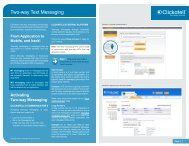

![Vodaphone's Terms and Conditions[1.1MB] - Clickatell](https://img.yumpu.com/41292711/1/184x260/vodaphones-terms-and-conditions11mb-clickatell.jpg?quality=85)
